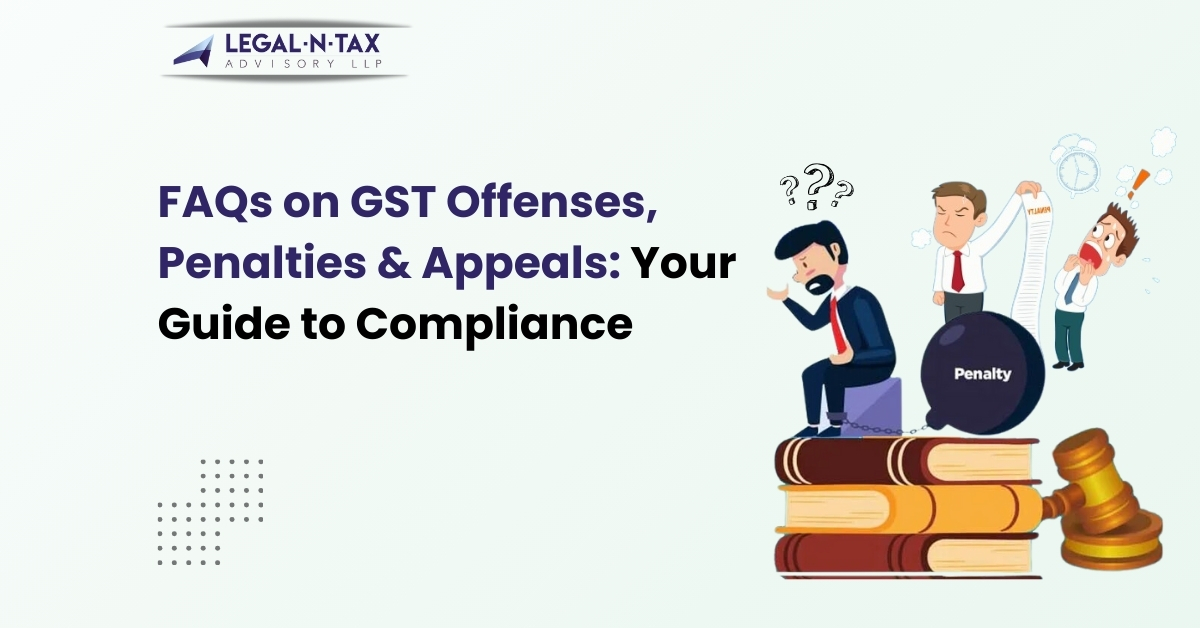aFAQs on GST Offenses, Penalties & Appeals: Your Guide to Compliance
GST / Mar 20, 2024

Navigating the complexities of Goods and Services Tax (GST) regulations in India is crucial for businesses to maintain compliance and avoid penalties. In this blog, we address frequently asked questions (FAQs) concerning GST offenses, penalties, and the appeals process, providing clarity and guidance to ensure adherence to regulatory requirements.
Understanding GST Offenses
What Constitutes a GST Offense?
GST offenses encompass various violations of tax laws, including:
- Non-filing of Returns: Failure to submit GST returns within the specified time frame.
- Input Tax Credit (ITC) Abuse: Incorrect or fraudulent claims of ITC.
- Evasion of Tax: Intentional underreporting of taxable supplies to evade tax liabilities.
Consequences of GST Offenses
The repercussions of committing GST offenses may include:
- Penalties: Monetary fines imposed by tax authorities.
- Prosecution: Legal action against offenders, leading to potential imprisonment.
- Cancellation of Registration: Revocation of GST registration for non-compliant businesses.
Penalties Imposed
Types of Penalties
GST penalties are categorized based on the nature and severity of the offense:
- Late Filing Penalty: Imposed for delayed submission of GST returns.
- Penalty for Tax Evasion: Levied on tax underpayment or fraudulent activities.
- Interest Charges: Accrued on delayed tax payments.
Penalty Rates
Penalty rates vary depending on the offense, ranging from a percentage of tax evaded to fixed amounts per day of delay in filing returns.
Appeals Process
Challenging Penalties
Businesses have the right to appeal against GST penalties through the following steps:
- Filing an Appeal: Submitting an appeal to the appropriate appellate authority within the prescribed time limit.
- Hearing: Attending a hearing where the appellant presents their case and provides evidence to support their appeal.
- Decision: Receiving a verdict from the appellate authority, which may include the reduction or dismissal of penalties.
Conclusion
Ensuring compliance with GST regulations is essential for businesses to avoid costly penalties and legal consequences. By understanding GST offenses, penalties, and the appeals process, businesses can proactively address compliance issues and mitigate risks. Stay informed, adhere to regulatory requirements, and seek professional guidance when necessary to maintain GST compliance and uphold the integrity of your business operations.
FAQs (Frequently Asked Questions)
-
What are the common GST offenses businesses should be aware of? Common GST offenses include non-filing of returns, abuse of input tax credit, and evasion of tax liabilities.
-
How can businesses minimize the risk of GST offenses? Adopting robust internal controls, conducting regular audits, and staying updated on GST regulations can help mitigate the risk of non-compliance.
-
What are the penalties for late filing of GST returns? Late filing penalties vary based on the duration of delay and turnover of the business, ranging from fixed amounts to a percentage of tax liabilities.
-
Is there an appeals process available for businesses penalized under GST? Yes, businesses have the right to appeal against GST penalties by submitting appeals to the appellate authority within the stipulated time frame.
-
Where can businesses seek assistance regarding GST compliance and appeals? Legal N Tax India offers expert guidance and assistance to businesses navigating GST compliance, penalties, and appeals processes, ensuring adherence to regulatory requirements.
Share this with others:




